Thanksgiving meals will yield plenty of leftovers, so how do you store them safely?
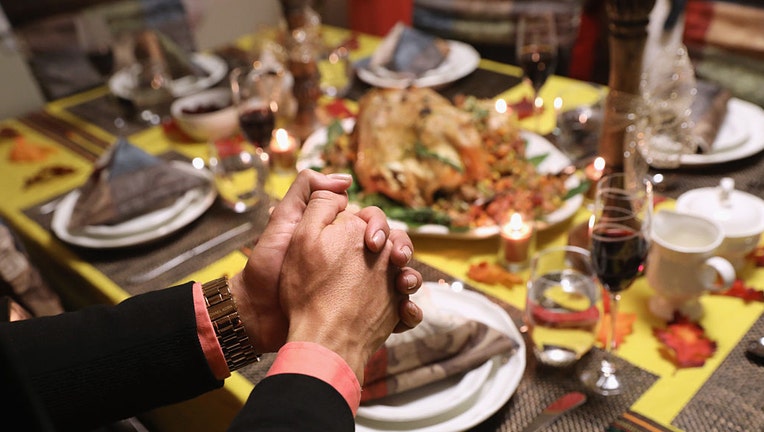
FILE- A family prays before Thanksgiving dinner on November 24, 2016 in Stamford, Connecticut. (Photo by John Moore/Getty Images)
With the holidays up ahead, most people will have an excess of food in the house left over after Thanksgiving and beyond.
Plus, holiday time or not, cooking large meals can be a way to stretch your budget — and then take a break from cooking and enjoy the leftovers for a few days.
So how exactly should you store all this food — and how long can you safely eat leftovers?
AFFORDABLE, NO-FUSS WEEKNIGHT MEAL: STUFFED PEPPERS ARE ‘HEARTY, HEALTHY AND FAMILY-FRIENDLY'
Two food experts shared some smart leftover food safety guidelines.
Here’s what you need to know to stay safe — and to waste as little food as possible.
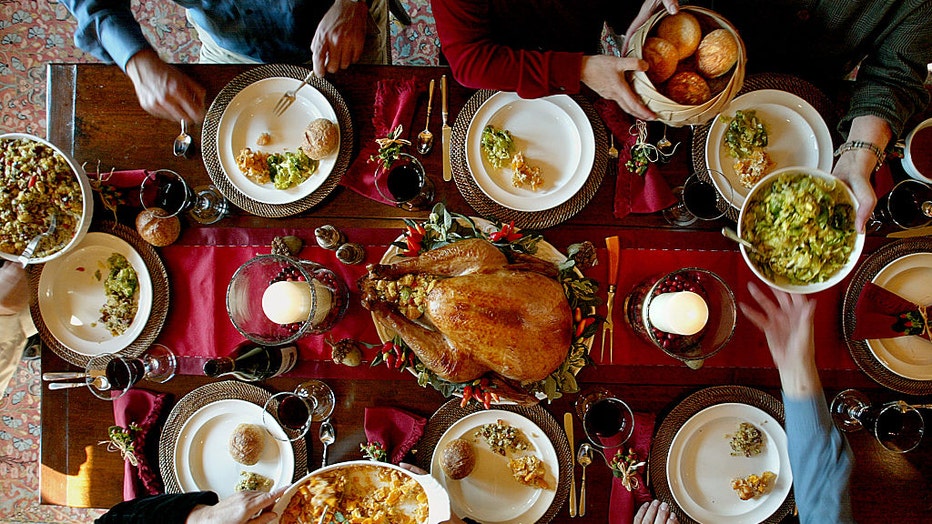
FILE-People gather for Thanksgiving dinner sitting around the turkey. (Photo by Kirk Mckoy/Los Angeles Times via Getty Images)
How long can cooked poultry, beef or seafood leftovers or vegetable-based dishes be kept safely in the fridge?
If you’re creating a meal with meat or seafood, be sure to refrigerate leftovers in a timely fashion to preserve the meal.
The leftovers should be fine for a few days.
"Our general rule is that all cooked food is safe in a refrigerator kept at 40F for up to four days," said Jesus Garcia, public affairs specialist with the USDA Food Safety and Inspection Service, in Washington, D.C.
FROM SALMON TO SHARK, HERE ARE THE BEST AND WORST FISH FOR YOUR HEALTH
"By the fourth day, you should consume, freeze it or discard it," he said.
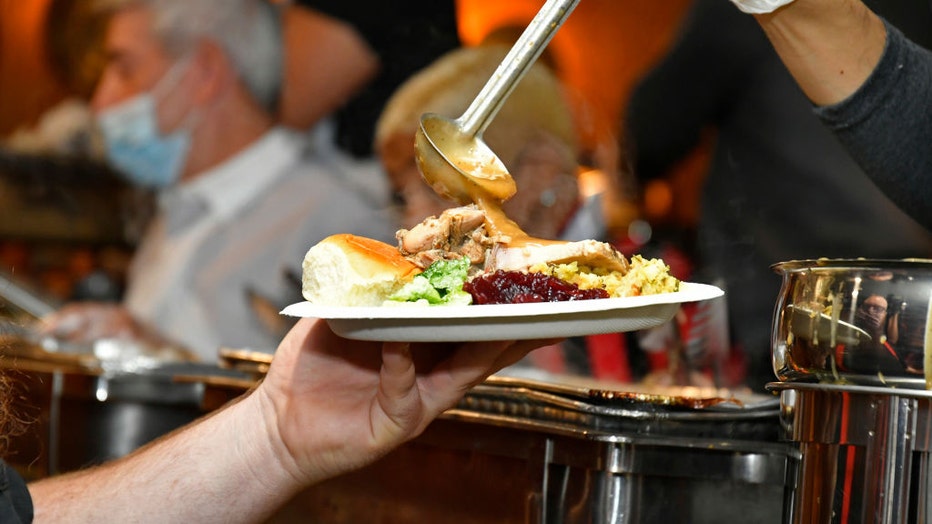
FILE-A guest enjoys Thanksgiving dinner at the Laugh Factory's 41st free Thanksgiving dinner at The Laugh Factory on November 25, 2021 in West Hollywood, California. (Photo by Michael Tullberg/Getty Images)
Why is a speedy table-to-fridge transition after serving so important?
All perishable items, including raw and cooked meat and poultry, should be refrigerated within two hours of coming out of the refrigerator or being cooked, said Garcia.
"After two hours in the ‘danger zone,’ which is temperatures between 40F and 140F, bacteria can multiply to dangerous levels and cause the food to become unsafe," Garcia told Fox News Digital.
What are some other ways to store leftovers safely?
It’s important to break down large meals like turkey or roast beef into smaller portions and store them in shallow containers so that items may cool faster, said Garcia.
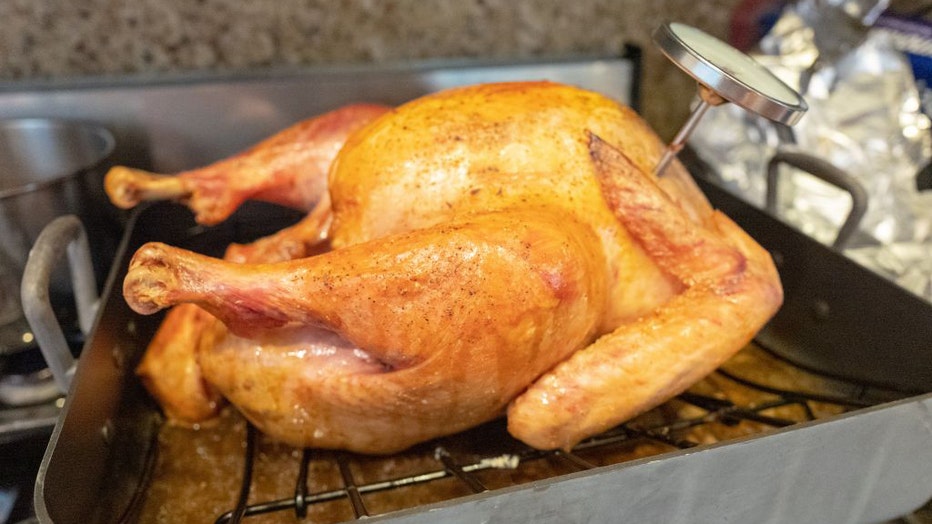
A cooked turkey sits in a roasting pan with a meat thermometer during the preparation of a traditional American Thanksgiving holiday meal, San Ramon, California, November 23, 2019. (Photo by Smith Collection/Gado/Getty Images)
Other smart strategies are to cover leftovers, wrap them in airtight packaging or seal them in storage containers, he said.
BEST FOODS TO EAT FOR RADIANT, AGELESS SKIN AND WHAT TO AVOID, ACCORDING TO NUTRITIONISTS
"These practices help keep bacteria out, retain moisture and prevent leftovers from picking up odors from other food in the refrigerator. Immediately refrigerate or freeze the wrapped leftovers for rapid cooling," Garcia said.
Vanessa Imus, MS, RDN of Integrated Nutrition for Weight Loss (inutritioncenter.com) in Bothell, Washington, told Fox News Digital that leftovers should always be put away into a storage container with a well-fitting lid or covered sufficiently in airtight packaging to keep bacteria out.
She also said it’s very important to cool food rapidly.
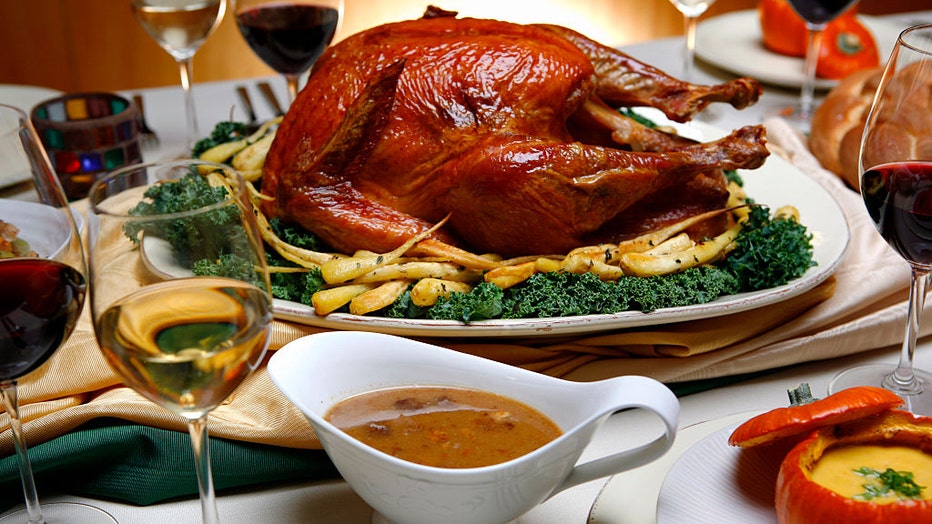
A salt rubbed, roasted turkey with roasted parsnips, pan sauce, center and spiced pumpkin soup with maple syrup in roasted pumpkins, are part of a Thanksgiving dinner. (Photo by Jay L. Clendenin/Los Angeles Times via Getty Images)
"This means that if you have a big pot of soup or a large cut of meat, you’ll need to break it down into smaller portions before placing it in the refrigerator," Imus said.
As anyone can imagine, a whole turkey placed in the fridge will take longer to cool than sliced meats put away in several small containers, she said.
What are the warning signs you may need to toss the food (better to be safe than sorry)?
You should not rely entirely on sight or smell to determine if leftovers are edible and safe, Imus pointed out.
SPINACH VS. KALE: WHICH IS 'BETTER' FOR YOU? NUTRITIONISTS SETTLE THE GREAT DEBATE
"Although I’ve seen friends do the ‘sniff test,’ that is not an accurate way to measure the safety of your leftovers. Your food may look perfectly fine, but that doesn’t mean it is perfectly fine," she said.
Instead, she agreed with Garcia to stick to the four-day rule.
"If you didn’t label your food and you can’t remember when you originally prepared it, then it’s time to throw it out," Imus said.
"You would much rather be safe than sorry as the risk of food poisoning goes up after four days in the refrigerator."
What about re-heating? Are there protocols to use?
Always make sure to reheat leftovers to 165 degrees, said Imus.
"Yep, that means you’ll need a thermometer to check. Since microwaves can cause some cold pockets, be sure to stir and turn food as you reheat it," she added.
What about the timing for all those holiday leftovers?
"The problem that people run into is that they’re busy hosting and entertaining and not paying attention to how long food is sitting out," Imus told Fox News Digital.
THESE ARE THE WORST COOKING OILS FOR YOUR HEALTH, EXPERTS SAY
"Plus the guests might be coming and going or lingering over the food table throughout the evening."
She warned that this usually leads to food sitting out far beyond the recommended two-hour time limit.
"Be sure to check the time when you set the food out and get it put away into the fridge within two hours. Better yet, set a timer to remind yourself," added Imus.
Garcia with the USDA said Thanksgiving leftovers will sustain you from Black Friday to Cyber Monday.
"Reheating in an oven or a microwave will take longer for dense foods such as turkey or roast beef than for less dense foods like breads and small vegetables," he said.
"Leftovers should reach a safe internal temperature of 165F as measured by a food thermometer," he also said.
The experts again emphasized breaking down the turkey or other large dishes into smaller portions and storing those smaller portions in shallow containers.
Other critical tips to know
Handwashing is the first step to avoiding foodborne illness, said Garcia.
"Wash your hands for at least 20 seconds with soap and water before, during and after handling food. Then pat dry with clean paper towels," he said.
Anyone can email MPHotline@usda.gov to reach a food safety expert or chat live at ask.usda.gov at certain times. There is also a hotline to call for those interested: 1-888-MPHotline (1-888-674-6854).
Get the latest updates on this story at FOXNews.com
For more Lifestyle articles, visit www.foxnews.com/lifestyle.
Erica Lamberg is a contributing reporter for Fox News Digital.

